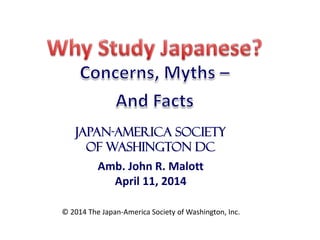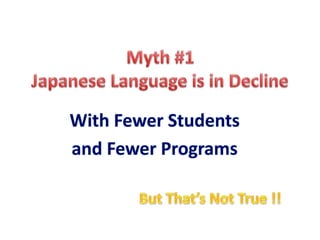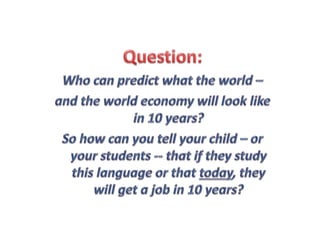Why Study Japanese
- 1. Japan-America Society of Washington DC Amb. John R. Malott April 11, 2014 ? 2014 The Japan-America Society of Washington, Inc.
- 2. ? Chinese is language of future; Japanese is language of past ? If children study Chinese, theyĪ»ll get a job; if they study Japanese, they wonĪ»t ? Just because my child likes Japanese pop culture is no reason to learn Japanese Question: Why is this a choice between Chinese and Japanese? Both languages are important to AmericaĪ»s future.
- 4. ? The number of Americans studying Japanese is the highest in history! In 2012 there were over 160,000 students at all levels. ? Enrollments at the pre-college level have increased 20% in the past six years and now top 80,000. ? The number of US junior and senior high schools teaching Japanese jumped from 595 in 2009 to 722 in 2012 (+20%). ? Today more students learn Japanese in high school than in college. Source: Japan Foundation
- 5. Again, not true! Here are the facts: ? Japan is world's third largest economic power ? JapanĪ»s GDP is bigger than Germany, France, England, Italy, or Spain ? JapanĪ»s per capita income is six times ChinaĪ»s
- 6. ? Japan is a world leader in in energy, medical research, materials research, the environment, transportation, telecommunications, digital imaging, and other 21st century industries ? Japan has won 25 Nobel prizes in science in 25 years. In past 5 years, Japan has won 7 Nobel prizes in science; UK 4; France 2; Germany 1; China 0; Italy 0; India 1; and South Korea 0.
- 7. From Frank Lloyd Wright to Steve Jobs, Japan has had a great influence on the US, in: ? Art and architecture ? Interior and graphic design ? Product design and business management ? Literature and film ? Music and theatre ? Cuisine and fashion
- 8. ? A military ally of United States ? A foreign policy partner worldwide ? A key player in Asia ? Strong trade and investment ties ? People to people ties for 70 years ? Educational, scientific, cultural ties
- 9. Foreign direct investment (FDI) in US creates jobs ? Japan is 2nd largest investor in US, after UK ? Japan FDI $149 billion in US over past 10 years, while China invested just $3 billion ? In 2012 only 0.3% of new FDI in US came from China; JapanĪ»s investment was 27 times as large!
- 10. ? 300 million Chinese learning English today ? 4 million Americans of Chinese heritage in US ? In 2012, 8% of immigrants to US were Chinese (only Mexico was higher) Question: When companies want Chinese speakers, whom will they hire??
- 12. ? Choosing a language is not just about business, economics, technology, or geopolitics ? If it were, then more Americans would study German than French ©C but they donĪ»t ? There are other reasons to study a language: ?What language will you enjoy studying? ?What country and culture will you enjoy learning about? ?Which language will open the door to new ways of thinking and understanding? ?Overall, which language motivates you and brings both enjoyment and challenge? For many young Americans, the answer has been ©C and will continue to be Ī░Japanese.












